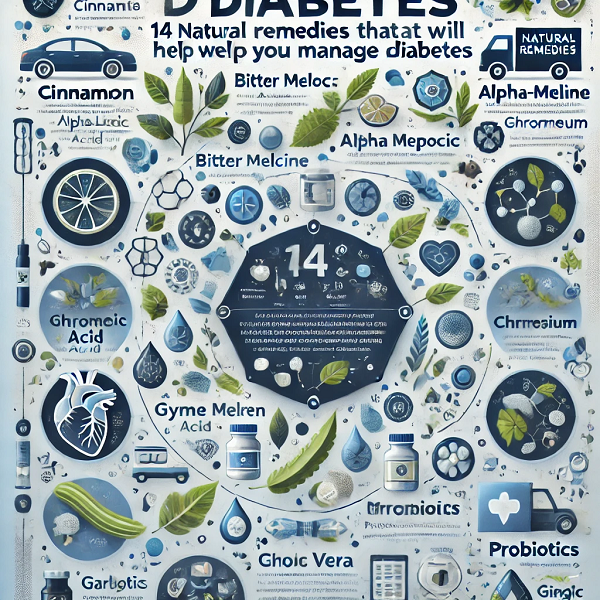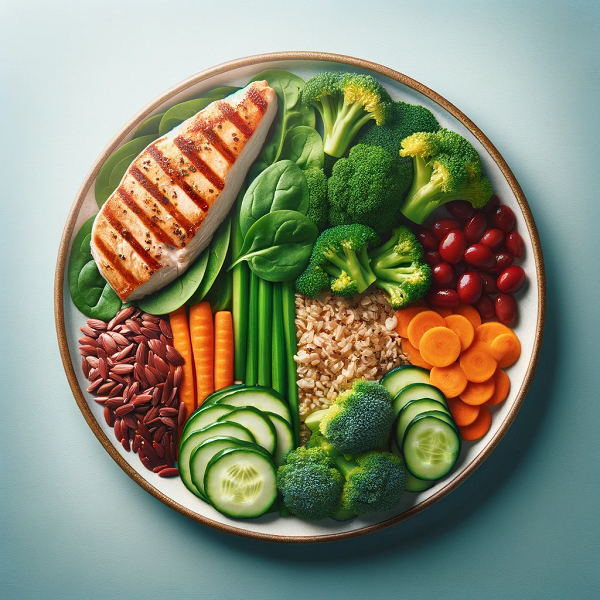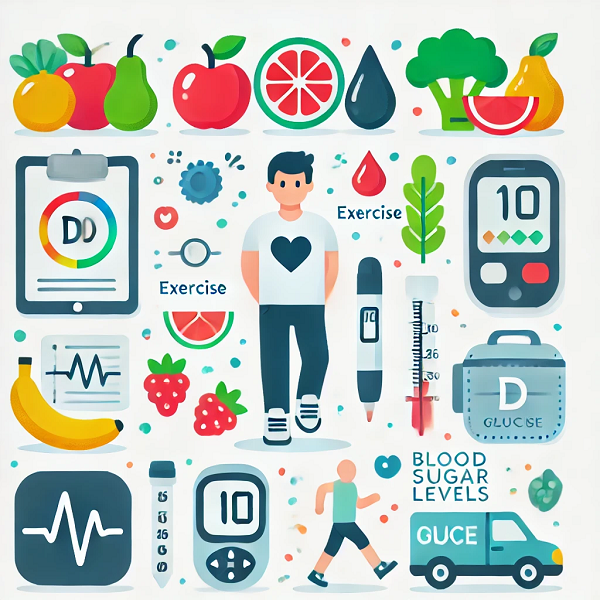Diabetes is a chronic condition that affects millions of people worldwide. It occurs when the body cannot properly regulate blood sugar levels, leading to high blood glucose. Managing diabetes typically involves a combination of lifestyle changes, medication, and sometimes insulin therapy. However, many people are also turning to natural remedies and supplements to help control their blood sugar levels. This article explores some of the most effective natural remedies and supplements for diabetes, backed by scientific research.
1. Cinnamon
Cinnamon is a popular spice that has been used for centuries for its medicinal properties. Recent studies suggest that cinnamon can help lower blood sugar levels by increasing insulin sensitivity. One study found that consuming cinnamon reduced fasting blood sugar levels by up to 29% in people with type 2 diabetes. The active compounds in cinnamon, such as cinnamaldehyde, are believed to improve insulin sensitivity and glucose uptake by cells.
2. Berberine
Berberine is a compound extracted from various plants, including the Chinese herb Coptis chinensis. It has been used in traditional Chinese medicine for centuries to treat various ailments, including diabetes. Research has shown that berberine can significantly lower blood sugar levels and improve insulin sensitivity. It works by activating an enzyme called AMPK, which helps regulate metabolism and blood sugar levels. Some studies have even suggested that berberine is as effective as some pharmaceutical drugs used to treat diabetes.
3. Alpha-Lipoic Acid
Alpha-lipoic acid (ALA) is an antioxidant that is naturally produced in the body and found in certain foods. It has been shown to reduce oxidative stress, improve insulin sensitivity, and lower blood sugar levels. ALA also helps protect against diabetic neuropathy, a common complication of diabetes that causes nerve damage. Supplementing with alpha-lipoic acid has been found to reduce symptoms of diabetic neuropathy, such as pain, tingling, and numbness.
4. Bitter Melon
Bitter melon is a fruit commonly used in traditional medicine to treat diabetes. It contains compounds called charantin and momordicin, which have been shown to lower blood sugar levels. Bitter melon works by increasing insulin secretion, improving glucose uptake by cells, and reducing glucose production in the liver. Studies have found that bitter melon can lower fasting blood sugar levels and improve glucose tolerance in people with diabetes.
5. Fenugreek
Fenugreek is an herb that has been used in traditional medicine for its various health benefits, including its ability to lower blood sugar levels. Fenugreek seeds are rich in soluble fiber, which helps slow down the digestion and absorption of carbohydrates. This can lead to a more gradual rise in blood sugar levels after meals. Research has shown that fenugreek can improve insulin sensitivity and reduce fasting blood sugar levels in people with type 2 diabetes.
6. Gymnema Sylvestre
Gymnema sylvestre is an herb native to India that has been used in Ayurvedic medicine for centuries to treat diabetes. It contains compounds called gymnemic acids, which are believed to reduce the absorption of sugar in the intestines and enhance insulin secretion. Studies have found that gymnema sylvestre can lower blood sugar levels and improve HbA1c, a marker of long-term blood sugar control, in people with type 2 diabetes.
7. Aloe Vera
Aloe vera is a succulent plant known for its various health benefits. It has been shown to help lower blood sugar levels and improve insulin sensitivity. Aloe vera contains compounds such as glucomannan, which can help reduce fasting blood sugar levels. Some studies have found that supplementing with aloe vera can improve HbA1c and fasting blood sugar levels in people with type 2 diabetes.
8. Chromium
Chromium is a trace mineral that plays a crucial role in carbohydrate and lipid metabolism. It is an essential component of a compound called chromodulin, which helps enhance the action of insulin. Research has shown that chromium supplementation can improve insulin sensitivity and reduce blood sugar levels in people with type 2 diabetes. Some studies have also suggested that chromium can help reduce HbA1c and fasting blood sugar levels.
9. Magnesium
Magnesium is an essential mineral that is involved in numerous bodily functions, including glucose metabolism. Low magnesium levels have been associated with an increased risk of developing type 2 diabetes. Supplementing with magnesium has been shown to improve insulin sensitivity and reduce blood sugar levels in people with diabetes. It can also help reduce the risk of developing diabetes-related complications, such as cardiovascular disease.
10. Turmeric
Turmeric is a spice commonly used in cooking, particularly in Indian cuisine. It contains an active compound called curcumin, which has powerful anti-inflammatory and antioxidant properties. Research has shown that curcumin can help lower blood sugar levels, improve insulin sensitivity, and reduce the risk of developing type 2 diabetes. Some studies have also suggested that curcumin can help reduce HbA1c and fasting blood sugar levels in people with diabetes.
11. Probiotics
Probiotics are beneficial bacteria that can improve gut health and overall well-being. Emerging research suggests that probiotics may also play a role in managing diabetes. Some studies have found that certain strains of probiotics can improve insulin sensitivity, reduce blood sugar levels, and decrease inflammation. Supplementing with probiotics can help restore the balance of gut bacteria, which may have a positive impact on blood sugar control.
12. Garlic
Garlic is a popular culinary herb known for its various health benefits. It contains compounds such as allicin, which have been shown to have anti-diabetic properties. Research has found that garlic can help lower blood sugar levels, improve insulin sensitivity, and reduce inflammation. Some studies have also suggested that garlic can help reduce HbA1c and fasting blood sugar levels in people with diabetes.
13. Ginger
Ginger is a spice commonly used in cooking and traditional medicine. It contains active compounds called gingerols, which have been shown to have anti-inflammatory and antioxidant properties. Research has found that ginger can help lower blood sugar levels, improve insulin sensitivity, and reduce inflammation. Some studies have also suggested that ginger can help reduce HbA1c and fasting blood sugar levels in people with diabetes.
14. Ginseng
Ginseng is a popular herb used in traditional medicine for its various health benefits. It contains compounds called ginsenosides, which have been shown to have anti-diabetic properties. Research has found that ginseng can help lower blood sugar levels, improve insulin sensitivity, and reduce inflammation. Some studies have also suggested that ginseng can help reduce HbA1c and fasting blood sugar levels in people with diabetes.
Conclusion
Managing diabetes effectively requires a combination of lifestyle changes, medication, and sometimes insulin therapy. However, natural remedies and supplements can also play a significant role in helping to control blood sugar levels and improve overall health. It is important to consult with a healthcare professional before starting any new supplement or natural remedy, as some may interact with medications or have side effects. With the right approach, it is possible to manage diabetes effectively and reduce the risk of complications.
References
- Cinnamon and Diabetes: A Systematic Review
- Berberine for Diabetes Management
- Alpha-Lipoic Acid and Diabetic Neuropathy
- Bitter Melon and Blood Sugar Control
- Fenugreek and Glycemic Control
Keywords
diabetes, natural remedies, supplements, blood sugar, insulin sensitivity, cinnamon, berberine, alpha-lipoic acid, bitter melon, fenugreek
Hashtags
#Diabetes #NaturalRemedies #Health #Wellness #Supplements #BloodSugarControl #InsulinSensitivity #HerbalMedicine #HealthyLiving #DiabetesManagement







